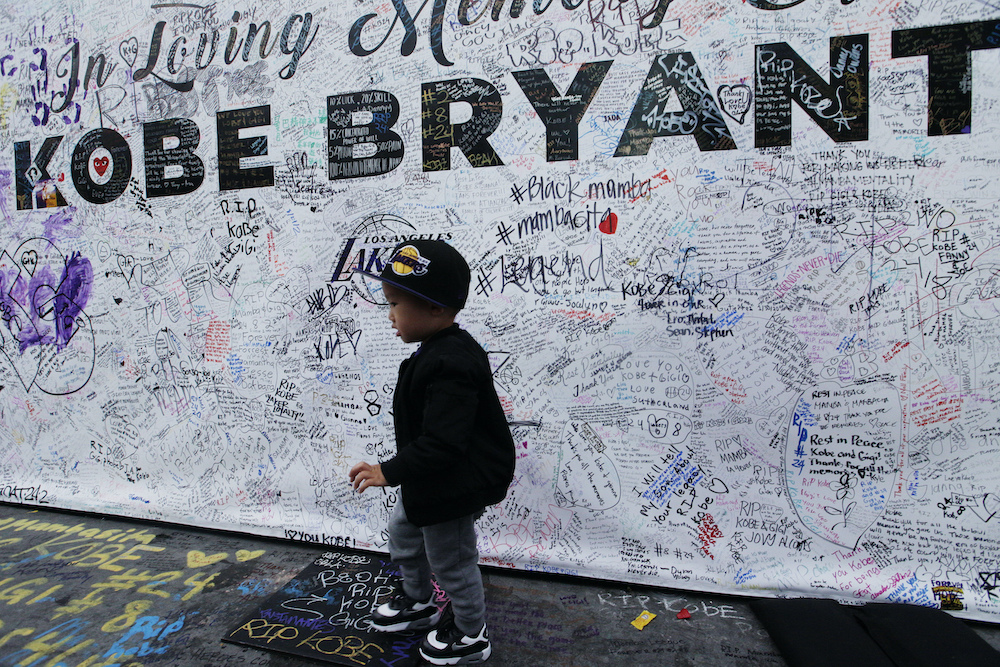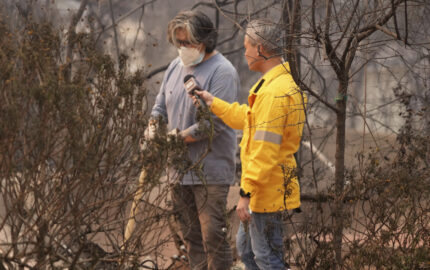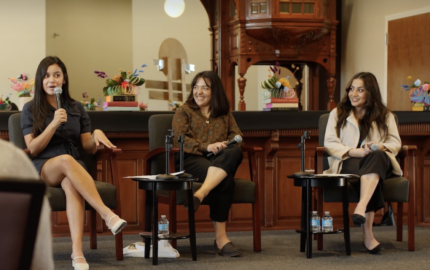When The Washington Post tried to silence reporter Felicia Sonmez, it was likely guided by a tradition bias — a preference for the way things have been over how they should be — that has caused numerous news organizations to make ill-fated, harmful decisions, particularly concerning the thorny issue of how best to deal with and cover sexual assault allegations.
Sonmez’s journalistic sin was that she didn’t wait an undetermined amount of time after NBA superstar Kobe Bryant and eight others had been killed in a helicopter crash before reminding readers about the sexual assault allegation Bryant had faced nearly two decades ago in Colorado. Or maybe it was that her tweet linking to a Daily Beast story about that allegation was supposedly out of context. Or that it was just cruel and unkind to Bryant’s family and friends and legions of fans who were in shock and mourning across the globe.
Sonmez has been open about her personal story. She said she was sexually assaulted by a former colleague, an issue that has been explained in excoriating detail in multiple published reports. Her critics used that against her, claiming she can’t be objective because of those experiences.
“Felicia,” the Post’s executive editor Marty Baron said in an email to Sonmez. “A real lack of judgment to tweet this. Please stop. You’re hurting this institution by doing this.”
Sonmez was briefly suspended for her hard-to-define journalistic sin. And even after a quick internal investigation determined she had broken none of the Post’s social media policies, Tracy Grant, the Post’s managing editor for staff development and standards, said “Felicia’s tweets were ill-timed.” Hundreds of journalists at the Post, and countless others, have decried the Post’s actions. Still, I can’t help but wonder if the newspaper’s leadership fully understands what they got wrong and why.
Sonmez wasn’t attacked by readers and her editors because her tweets were ill-timed. (She had to leave her house because the threats had become so intense.) Neither was she attacked because of context. I’ve heard of no journalist who was suspended or admonished for tweeting strictly positive things about Bryant, sans context.
If the Post’s reaction was solely because her tweet was ill-timed, no amount of broader context would have mattered anyway. She didn’t link to a story full of half-truths and baseless accusations; the Daily Beast story was solidly reported. And if it was just about context, no one would have cared about the timing, not unless there is a journalistic principle I don’t know about that says reporting something negative about some select, unknowable group of high-profile public officials is off limits for the first two hours after their deaths. Or maybe the first couple of days? Weeks?
What CBS News’s Gayle King did when interviewing WNBA legend Lisa Leslie, a close Bryant friend, underscored how absurd that unspoken rule has become. King asked how Leslie was processing the rape allegation, given all she knew about Bryant. The questions were respectful and full of context. They came almost a couple of weeks after Bryant’s death. No matter. King still felt compelled to apologize, saying she was mortified when she discovered the way CBS had chosen to broadcast a 94-second portion of a much longer interview that focused on her questions to Leslie about the rape allegation. But neither King nor CBS did anything wrong. Take a look at the clip for yourself. King, who became a kind of cult hero for tough questioning of singer R. Kelly, gave in to the pressure to never speak ill of a popular man.
And so did Baron. He was so busy claiming Sonmez’s tweet as supposedly harming the Post he didn’t realize that his reaction is part of a much larger problem.
Sonmez felt the need to remind the audience of the rape allegation because she was thinking about how rape victims might be feeling as tens of millions of people lavished unvarnished praise on a man credibly accused of doing a dastardly thing. Baron’s email to Sonmez sent a chilling message to sexual assault survivors: if the man is powerful and popular enough, even journalists will turn a blind eye to the harm he’s caused, and we will do it even in the era of #MeToo.
That’s why journalists have had trouble recognizing sexual assault and gender-based abuse within our ranks. It’s why we struggle to strike the right balance between honoring victims’ stories – knowing most victims won’t ever get justice inside a courtroom – and ensuring we treat the accused fairly. It’s not easy. But it is made worse by the kind of blind spots Sonmez’s tweet exposed.
I don’t believe Baron and other editors at the Post were guided by animus or sexism, just as I don’t believe racism guided their pressuring another reporter, Wesley Lowery, to not use his Twitter account to speak forthrightly when The New York Times botched a story about the Tea Party. It’s more a case of tradition bias, a preference for the way things have long been, convincing you to mistakenly believe that that’s the way they should always be.
Because of that, reporters like Sonmez will always present a challenge to editors. Even if unwittingly, they seem to want to be able to say they have sexual assault survivors on staff but wish those survivors didn’t bring their scars with them; just as they want our black faces but not the insights we’ve gained from our black experiences.
Sonmez’s tweet didn’t hurt “the institution” that is The Washington Post. The inability of its top editors to know to honor the perspectives of sexual assault victims as much as they knew to honor the image of a popular, powerful but credibly-accused man did—and does.
Sonmez’s journalistic sin was that she didn’t wait an undetermined amount of time after NBA superstar Kobe Bryant and eight others had been killed in a helicopter crash before reminding readers about the sexual assault allegation Bryant had faced nearly two decades ago in Colorado. Or maybe it was that her tweet linking to a Daily Beast story about that allegation was supposedly out of context. Or that it was just cruel and unkind to Bryant’s family and friends and legions of fans who were in shock and mourning across the globe.
Sonmez has been open about her personal story. She said she was sexually assaulted by a former colleague, an issue that has been explained in excoriating detail in multiple published reports. Her critics used that against her, claiming she can’t be objective because of those experiences.
“Felicia,” the Post’s executive editor Marty Baron said in an email to Sonmez. “A real lack of judgment to tweet this. Please stop. You’re hurting this institution by doing this.”
Sonmez was briefly suspended for her hard-to-define journalistic sin. And even after a quick internal investigation determined she had broken none of the Post’s social media policies, Tracy Grant, the Post’s managing editor for staff development and standards, said “Felicia’s tweets were ill-timed.” Hundreds of journalists at the Post, and countless others, have decried the Post’s actions. Still, I can’t help but wonder if the newspaper’s leadership fully understands what they got wrong and why.
Sonmez wasn’t attacked by readers and her editors because her tweets were ill-timed. (She had to leave her house because the threats had become so intense.) Neither was she attacked because of context. I’ve heard of no journalist who was suspended or admonished for tweeting strictly positive things about Bryant, sans context.
If the Post’s reaction was solely because her tweet was ill-timed, no amount of broader context would have mattered anyway. She didn’t link to a story full of half-truths and baseless accusations; the Daily Beast story was solidly reported. And if it was just about context, no one would have cared about the timing, not unless there is a journalistic principle I don’t know about that says reporting something negative about some select, unknowable group of high-profile public officials is off limits for the first two hours after their deaths. Or maybe the first couple of days? Weeks?
What CBS News’s Gayle King did when interviewing WNBA legend Lisa Leslie, a close Bryant friend, underscored how absurd that unspoken rule has become. King asked how Leslie was processing the rape allegation, given all she knew about Bryant. The questions were respectful and full of context. They came almost a couple of weeks after Bryant’s death. No matter. King still felt compelled to apologize, saying she was mortified when she discovered the way CBS had chosen to broadcast a 94-second portion of a much longer interview that focused on her questions to Leslie about the rape allegation. But neither King nor CBS did anything wrong. Take a look at the clip for yourself. King, who became a kind of cult hero for tough questioning of singer R. Kelly, gave in to the pressure to never speak ill of a popular man.
And so did Baron. He was so busy claiming Sonmez’s tweet as supposedly harming the Post he didn’t realize that his reaction is part of a much larger problem.
Sonmez felt the need to remind the audience of the rape allegation because she was thinking about how rape victims might be feeling as tens of millions of people lavished unvarnished praise on a man credibly accused of doing a dastardly thing. Baron’s email to Sonmez sent a chilling message to sexual assault survivors: if the man is powerful and popular enough, even journalists will turn a blind eye to the harm he’s caused, and we will do it even in the era of #MeToo.
That’s why journalists have had trouble recognizing sexual assault and gender-based abuse within our ranks. It’s why we struggle to strike the right balance between honoring victims’ stories – knowing most victims won’t ever get justice inside a courtroom – and ensuring we treat the accused fairly. It’s not easy. But it is made worse by the kind of blind spots Sonmez’s tweet exposed.
I don’t believe Baron and other editors at the Post were guided by animus or sexism, just as I don’t believe racism guided their pressuring another reporter, Wesley Lowery, to not use his Twitter account to speak forthrightly when The New York Times botched a story about the Tea Party. It’s more a case of tradition bias, a preference for the way things have long been, convincing you to mistakenly believe that that’s the way they should always be.
Because of that, reporters like Sonmez will always present a challenge to editors. Even if unwittingly, they seem to want to be able to say they have sexual assault survivors on staff but wish those survivors didn’t bring their scars with them; just as they want our black faces but not the insights we’ve gained from our black experiences.
Sonmez’s tweet didn’t hurt “the institution” that is The Washington Post. The inability of its top editors to know to honor the perspectives of sexual assault victims as much as they knew to honor the image of a popular, powerful but credibly-accused man did—and does.



